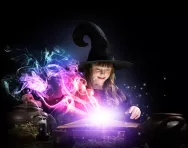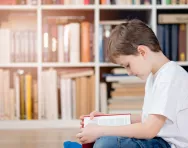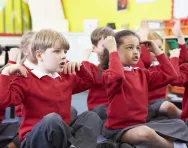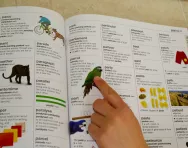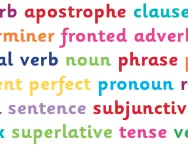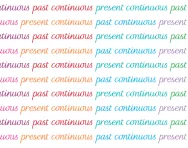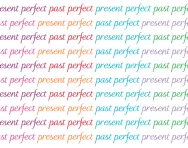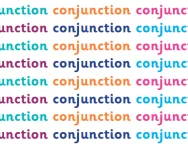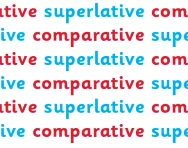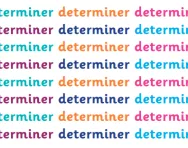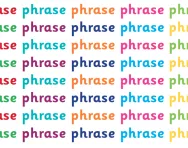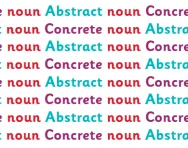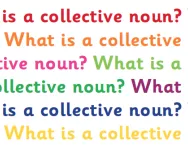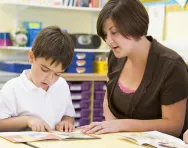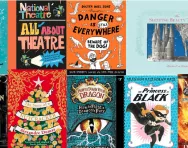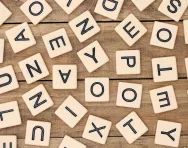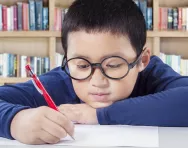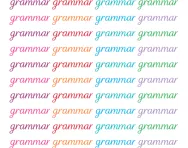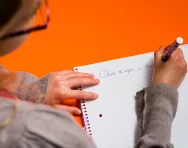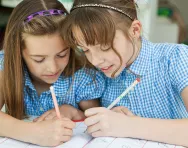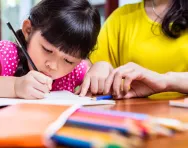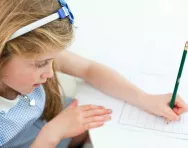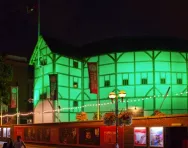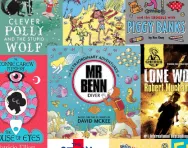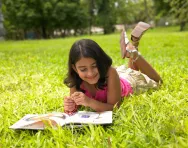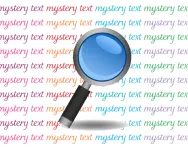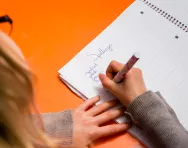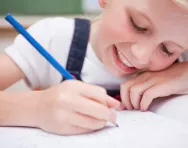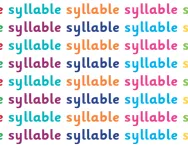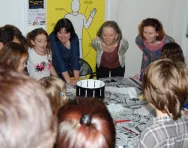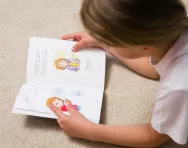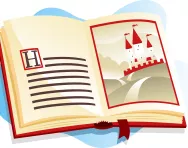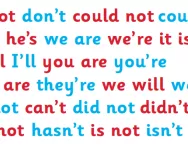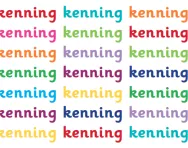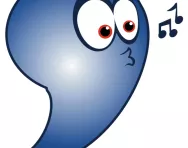Ks2 English articles
Best Halloween books for children
Witches and werewolves and vampires, oh my! Help your child get into the Halloween spirit with our round-up of the best ghost stories, haunted-house thrillers and supernatural tales for children. Not recommended for after-dark reading...
Expanding your child’s reading tastes
Is your child stuck in a reading rut? Lucy Dimbylow takes a look at how to encourage them to test the water with different styles and genres of fiction and non-fiction.
Best learning songs
Could songs and music help your child learn and remember English, maths and science facts? We pick our favourite learning songs, covering everything from adverbs and angles to onomatopoeia and photosynthesis.
Best reference books for children
Reference books and dictionaries offer us information that's accurate, well researched and beautifully presented and are invaluable when you're working on a homework project. From atlases to dictionaries and encyclopedias, we recommend some of the best English, maths, science, history and geography reference books for primary-school children.
Primary grammar glossary for parents
Do you know the difference between the subject and the subjunctive? Can you identify a relative clause or find a phrase? From active voice to verb tense, TheSchoolRun's primary-school grammar glossary offers a complete guide to all the grammatical concepts children are taught in EYFS, KS1 and KS2 English. As well as basic definitions we offer more detailed explanations, teachers' tips and examples for each grammar term.
What are the present continuous and the past continuous?
We use the present continuous and past continuous verb tenses when talking or writing about actions that continue or continued over a period of time In our parents' guide to the continuous or progressive verb tenses we explain what children are taught in the primary-school classroom.
What are the present perfect and the past perfect?
We use the present perfect and past perfect verb tenses when talking or writing about actions that are completed by the present or by a specific moment in the past or future. In our parents' guide to the perfect verb tenses we explain what children are taught in the primary-school classroom as part of the grammar curriculum.
What is the subjunctive?
Your child will learn about the subjunctive form as part of the Year 6 grammar curriculum. We explain what KS2 parents need to know about this verb form and how to recognise and use it correctly.
What is a conjunction?
Conjunctions are joining words that link different parts of sentences. In our parents' guide we explain how children learn about conjunctions as part of the primary-school grammar curriculum.
What are comparatives and superlatives?
We use the comparative and superlative forms of adjectives and adverbs to compare things, people, actions and states in our writing. Find out how your child is introduced to this concept, how they will learn to form the comparative and superlative and how they will practise using them in the primary-school classroom.
What is a determiner?
Determiners (a, the, many, one, my, their) identify nouns and are taught as part of the Y5 and Y6 grammar curriculum. We explain what primary-school parents need to know.
What is a phrase?
A phrase is a small group of words within a clause. We explain how children are taught about clauses as part of the primary-school grammar curriculum and what you need to know to support their learning at home.
What are concrete and abstract nouns?
Concrete and abstract nouns explained for primary-school parents, including examples of how your child might be introduced to them in the classroom.
What is a collective noun?
Collective nouns explained for primary-school parents, including examples of collective nouns and how they are used.
What are transitive and intransitive verbs?
Help your child with Year 6 grammar and understanding how sentences are constructed with our parents' guide to transitive and intransitive verbs.
Books or e-books: which are best for your child?
Reading purists may look down on e-books, but they could have some surprising benefits for your primary school child.
What is a free reader?
Every parent looks forward to their child graduating from reading scheme books, but how and when do they make the leap? We explain what a 'free reader' is and when your child is likely to graduate from reading schemes.
Teachers' tips for creative writing
How can children get to grips with creative writing? We asked teacher and author Jacqueline Harris for her insider advice.
16 of the best new books for children for Christmas 2015
Looking for the perfect books for your child to find under the tree? Whatever their interests or reading ability, there's a fantastic selection on offer this Christmas, from the latest Rick Riordan blockbuster to new classics, non-fiction treasures to pore over and laugh-out-loud funny reads. The holidays will be story-filled!
9 strategies for learning primary school spellings
If learning spellings always ends in tears and tantrums, trying another technique could help make it a less stressful process. We've rounded up the best methods to try.
What is a pen licence?
Earning a pen licence is a proud moment for many primary-school children, but what does your child need to do to achieve this milestone?
Grammar in primary school
From abstract nouns to verb tenses and the passive voice, your child will be taught lots of grammatical terminology and concepts during their time in primary school. Find out more about what they learn, when, and how grammar knowledge is tested in KS1 SATs and KS2 SATs.
6 ways to bring creative writing to life
Does your child’s writing lack a certain spark? We asked the experts for their top tips for injecting some colour into primary-school children's prose.
Creative writing prompts for kids
From pictures to music, using prompts can inspire your child to produce great writing. We look at the benefits of creative writing prompts, and how to use them.
Editing creative writing
Learning how to revise a piece of written work is an important skill for primary school children, and one that it’s never too soon to help them master.
How to encourage a reluctant writer
Are you longing for the day when your child produces a brilliant story all on their own? We look at some tried-and-tested techniques for getting unwilling writers to find their creative side.
Museums reviewed by parents: Globe Theatre
Experience the magic of the Shakespearean stage as a family at the Globe Theatre Exhibition and Tour in London. From stage fighting to period costumes, you'll be able to immerse yourself in Shakespeare's life, times and plays, and learn a few famous quotes too!
14 of the best books for children for summer 2015
Make this the summer when your child journeys to ancient Rome, becomes a secret agent, takes to the high seas, finds out about England's past, solves a mystery and discovers the delights of Mr Benn... all without leaving the sofa! From kids' classics to brand-new adventures, we've got 14 brilliant books for your children to lose themselves in over the 2015 summer holiday.
Best maths story books for children
Introduce ratio, pie charts, probability and even simplifying fractions to children with these brilliant maths story books, picture-book presentations of mathematical concepts that primary-school children will love.
What is mystery text?
Mystery text explained for parents, including examples of how children might work on crime stories in KS2 and suggestions of great mystery story books for children aged 8 to 12.
Spelling in Year 5 and Year 6
Spelling is an important part of the Year 6 Grammar, punctuation and spelling test. Support your child's learning at the end of KS2 with Y5 and Y6 spelling worksheets and activities to help practise the spelling rules and patterns they're learning at school.
Spelling in Year 3 and Year 4
From homophones to the use of prefixes and suffixes, spelling gets more technical in KS2. We explain what spelling patterns and rules your child will be introduced to in Year 3 and Year 4, and how you can support their learning with worksheets and activities at home.
What is a syllable?
Syllables explained for parents, including details of how primary-school children are taught to identify syllables to help them with spelling and reading and understanding poetry.
Museums reviewed by parents: The Cartoon Museum, London
From Hogarth and Ronald Searle to Manga to favourite characters like Dennis the Menace, there’s something for all comic lovers at the Cartoon Museum in London. We visited to find out what's on offer for primary-school children and parents.
The science of school reading schemes
Following a reading scheme at school can transform children from non-readers to bookworms in a surprisingly short space of time, but how are they developed and tested to help your child progress?
What is a fable?
Fables tell us a story and teach us a lesson at the same time and we've been hearing them, retelling them and writing them for over two thousand years. We explain how primary-school children learn about fables and Aesop in our guide for parents.
What is a traditional tale?
Traditional tales like Cinderella, Little Red Riding Hood and Goldilocks play an important part in early literacy. We explain how these well-known stories are used to help develop reading comprehension and early writing skills, and explain how you can help your child's learning with fairy tales at home.
What are contracted words or contractions?
Contracted words or contractions are used every day in spoken and written English. Help your child keep them straight with our parents' guide, including complete listings of the common contractions children learn to spell in Year 2 and throughout Key Stage 2.
What is a kenning?
Your child's KS2 poetry classes might include analysis of kennings, two-word phrases characteristic of Anglo-Saxon poetry. We explain what this literary device is and how your child might read and write kennings in the primary-school classroom.
What is an apostrophe?
Children are first introduced to apostrophes in Year 2. Help them practise punctuating correctly at home with our simple revision tips, covering the use of apostrophes for possession and omission.
